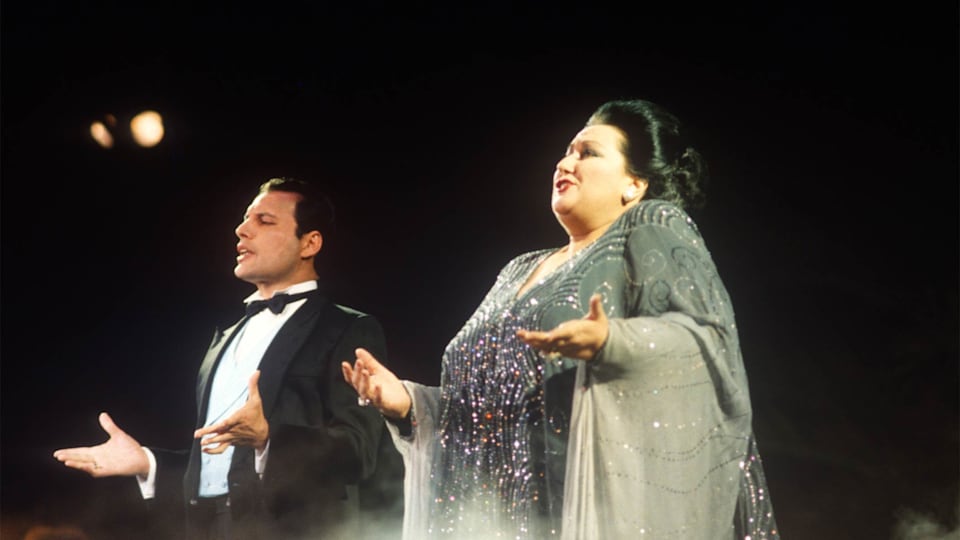When rock met opera: the story behind "Barcelona"
The idea of pairing one of rock’s most flamboyant frontmen with an internationally renowned operatic soprano to sing an Olympic Games anthem may not have been an obvious one, but wow was it a good one. Barcelona, the Freddie Mercury and Montserrat Caballé track, is one of the most magical musical moments in the 122 years of the modern Olympic Games. Here is the inside track on this extraordinary duet.

Montserrat Caballé was a clear choice to headline the Barcelona 1992 Olympic Games. A fiercely proud city resident, the charismatic diva had been stunning opera audiences across the globe through the 1960s, ’70s and early ’80s.
It was a whole lot less obvious, however, that her partner on her hometown Olympic project ought to be the British lead singer of one of the world’s most outlandish rock bands, Queen. Like many great couplings, luck and timing proved key.
Enthused by the rapturous response they had received when performing in London at Live Aid, the 1985 dual-venue charity concert, Queen threw off the lethargy which had been hampering them in the early 1980s and embarked on a world tour in 1986. And it was while promoting this that Mercury gave a highly significant answer to the simple question posed on Spanish radio: who in his view had the best voice in the world?
“Freddie replied, ‘I am not just saying this because I am in Spain but, as far as I am concerned, Montserrat Caballé has the best voice of anybody in existence’,” Lesley-Ann Jones, author of Freddie Mercury: the definitive biography, explained.
“And Montserrat got to hear about this. She had already been approached about the 1992 Olympics and no one is quite clear whose idea it was, but it just came together quite organically that Freddie and Montserrat would duet on an Olympic anthem.”
As far as I am concerned, Montserrat Caballé has the best voice of anybody in existence Freddie Mercury, quoted in Freddie Mercury: the definitive biography - Freddie Mercury, quoted in Freddie Mercury: the definitive biography
It only takes a few bars of the resulting track to realise that the duet was somehow meant to happen. It had certainly not taken the two stars long to realise that the chemistry was there.
“They met in Barcelona in March 1987,” Jones said. “They went to the Ritz and Monti (Caballé) kept them waiting for hours. Apparently that was her thing, she kept everybody waiting. They had a private lunch in a dining room with a piano in one corner.
“Peter Freestone (Mercury’s personal assistant) said both Freddie and Montserrat were very enamoured with each other, almost like they were falling in love at first sight. Of course that was never going to happen, they were completely ill-matched, but they really fell for each other.”
They quickly met again with Caballé heading to the Queen singer’s house in Kensington, London after a performance at the Royal Opera House.
“Now opera singers tend to go to bed early because of the voice but she went there one night for dinner and they stayed up until dawn, they were banging out Queen hits,” Jones laughed. “They kind of met their match.”
Opera and rock are not immediately natural bedfellows. The former requires years of highly specific training, while the latter thrives off a sense of chaos and abandon. But in Caballé and Mercury, the two disciplines found the perfect overlap.
“Freddie had a fantastic range, four-and-a-half octaves or something, which is pretty unusual for a rock star,” Jones said. “And there was a great humility to Freddie, he would always defer to someone who studied an art form. He was very aware he had a lot to learn from someone like Montserrat.
“He would happily put his own ignorance out there, walk in the room naked if you like and say, ‘This is how I can make it sound, you make it sound perfect.’
“And for Montserrat, there is a lovely piece of film where she is being interviewed after his death and she is bereft, she is missing him. She loved him.”
The naturally theatrical personalities of both – evident within the first few seconds of the Barcelona music video – also made them instantly compatible.
Up stepped producer and songwriter Mike Moran, and together the three of them wrote not only the single Barcelona but an entire album of duets. First released in 1987, Barcelona went to number eight in the UK charts, a historic achievement for a genre-crossover track.
Although not a sports fan, Mercury was reportedly fixated by the prospect of performing the song to a global TV audience of billions at the 1992 Olympic Games Opening Ceremony. Sadly, it was not to be. Diagnosed HIV-positive in 1987, Mercury died in 1991.
Caballé went on stage and poignantly performed alone in the Opening Ceremony in 1992, with Mercury’s unmistakeable vocals accompanying her.
The pair may have never made it on to the Olympic stage or indeed that at London’s Royal Opera House – according to Jones that was the plan after the Barcelona Games – but they did produce one of sport’s all-time classic songs.
“It is a piece of music that transcends the genres. It blends Freddie’s flamboyance and artistry at its absolute best. It has introduced probably millions of people to an operatic dimension that they might not have been interested in before,” Jones said of Barcelona, which reached number two in the UK charts after being re-released during the 1992 Olympic Games.
“Anything cross-genre is always hugely valuable. It stands out.”
Montserrat Caballé has passed away on 6 October 2018, aged 85.
